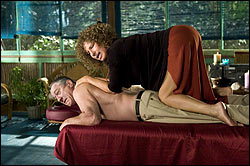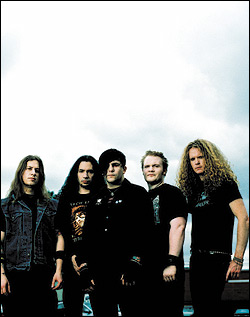There are three reasons this sequel exists: (1) It was green-lighted before Ben Stiller overexposed himself worse than a gremlin in sunlight, (2) the American public infinitely prefers Robert De Niro mailing in self-aware slapstick to actual acting work, and (3) a kitty cat that can flush its turds down the toilet is evidently the most uproarious comedic conceit since, well, Stiller’s character’s surname. All of this should make a delightful Christmas for adolescent cineplex ushers nationwide who took the job to earn cash for a used beater or laptop and will be greeted by countless peers requesting, “One for (muffled giggle) Meet the (excessive giggling, deep breath) FUCKERS!” (For the record, Meet the Fockers opens Wednesday, Dec. 22, at the Metro and other theaters.)
You remember the Woody Allen–lite premise of the 2000 original, Meet the Parents: male nurse Gaylord Focker . . . you know, let’s just stop right here. If even the tiniest chuckle just escaped your lips, either due to the character’s name or occupation, turn the page, because any further derision on my part will fall upon blind eyes. For the rest of the class, let’s move on. Focker (Stiller) is a kind, decent, bright, upwardly mobile young man, but a walking Murphy’s Law poster in the presence of his fiancée’s brusque, ex-CIA spook father, Jack Byrnes (De Niro).
Jack is a royal asshole, the kind of militaristic suburban daddy who believes no man short of John Wayne is good enough for his Barbie doll of a daughter, Pam (Teri Polo). Since Parents was a romantic comedy (ostensibly) and not a reality-TV series, the ensuing series of torturous, contrived conflicts was resolved without the engagement being terminated and Gaylord blowing his head off. This neatly sets up his next challenge before finally tying the knot: introducing Jack and wife Dina (Blythe Danner) to his parents, Bernie (Dustin Hoffman) and Roz (Barbra Streisand) Focker. Talk about your ’70s cinematic icons gone horribly awry. If this weren’t a $150 million–plus franchise, director Jay Roach would have The Hollywood Squares on his hands.
Of course, Gaylord’s folks have to be polar-opposite foils to stiff-upper-lip breadwinner Jack and acquiescing, desexualized Dina: Bernie’s a stay-at-home dad and Roz a sex therapist (lucky for Hoffman and Streisand that John and Teresa Heinz Kerry were unavailable during casting). Could these Happily Married but Very Different couples have lasting life lessons to teach each other? Actually, no. There’s nothing remotely positive about Jack, a red-state roughneck who refuses to coddle his greeting-card-cute grandson (Pam’s nephew, courtesy of older sister Deb), uses high-tech hidden cameras and sodium pentathol to humiliate Gaylord, and patronizes his wife and daughter with daffy “circle of trust” rhetoric.
In jarring contrast, the film explicitly states its message via the wildly eccentric elder Fockers: Embrace your weirdness and don’t be embarrassed about your foibles. This is all well and good (and trite) in principle, but the rational world would cease to exist if we behaved like Bernie and Roz, who save their son’s foreskin in a scrapbook, reveal horribly explicit details about his sexual history over dinner, and fuck loudly and luridly with guests trying to sleep downstairs. These two kooks are preferable to Jack? Only in the movies.
By the time Owen Wilson appears for his inevitable, he-must-be-stopped cameo, it’s clear that the Fockers are all about tsk-tsking us to try something new, even as they saddle us with the same old, same old. There was at least a modicum of inspired, Rube Goldberg timing in the original’s mantletop urn dinner disaster. Here, when Stiller is left alone to baby-sit his would-be nephew, Roach clumsily lingers on what will ultimately become the scene’s props—glue, a bottle of rum, a remote control, the fake strap-on teat Jack has invented for suckling—and our imaginations easily outrun the punch line to the checkered flag.
Most damningly, Fockers almost breaks you down in spite of its endless inanities, if only because the coasting cast boasts so much goddamn natural talent. By his third indignant harrumph (of 3,000), De Niro has pulled the curtain over his entire Scorsese filmography, and it actually seems like he was born to play this ridiculous, one-note role. Hoffman and Streisand put 110 percent into the Fockers’ slobbering physicality, and Stiller is more than passable underplaying the perfectly sane voice of reason. This is not a case of championing the silver lining so much as bemoaning it. We’ll eat up Fockers‘ elementary progressive moralizing and bawdy innuendos (only Dodgeball stretched the PG-13 limits further this year), and the cast members can sign up for another made-to-order cash-cow sequel instead of concentrating their still-formidable skills on something meaningful. Fock that shit.







